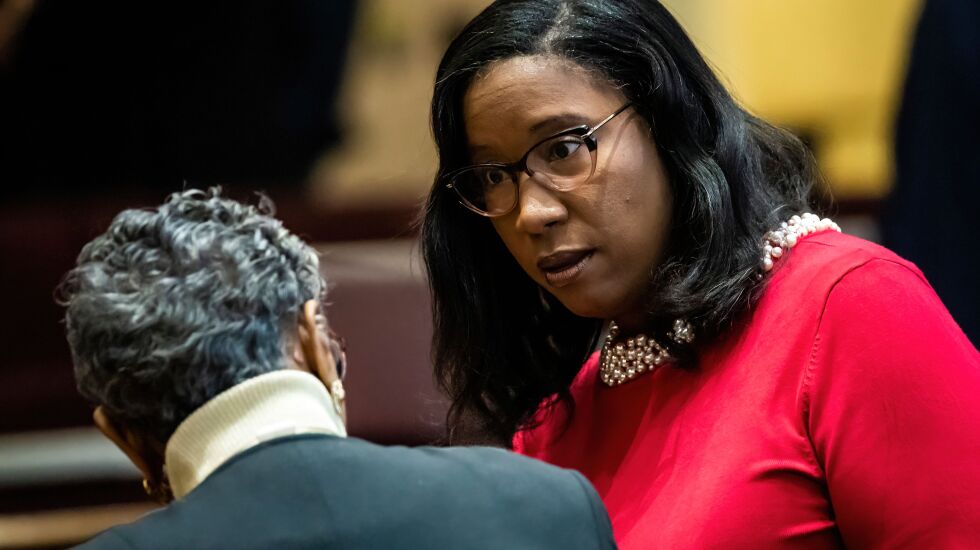
The city’s Board of Ethics opened a case looking into abuse of power allegations against City Treasurer Melissa Conyears-Ervin, but closed it after the city’s law department settled the complaint in a private agreement.
Board of Ethics Executive Director Steve Berlin told WBEZ that the allegations against Conyears-Ervin required an investigation by the Office of Inspector General in order to move forward, which the board did not receive. The Board of Ethics is responsible for adjudicating ethics complaints and issuing fines for violations, but it does not have investigatory authority.
Berlin did not say whether the board ever referred the case to Chicago Inspector General Deborah Witzburg, citing city law he says prevents him from disclosing that. Witzburg did not comment on whether her office is in the process of conducting an investigation.
The Chicago Tribune reported Tuesday that Conyears-Ervin faced allegations from two employees who, through an attorney in 2020, wrote a letter to the ethics board accusing the treasurer of abusing her power and demanding a full investigation. The letter was released under Mayor Brandon Johnson’s administration last week, according to the Tribune.
The employees accused Conyears-Ervin of requiring staff to perform personal tasks — such as planning her daughter’s birthday party or grocery shopping — and of trying to force a bank the city does business with to issue a mortgage on her husband’s aldermanic office the Tribune reported.
The city settled the complaint for $100,000, putting an end to the possibility of a wrongful termination lawsuit. The settlement amount kept it just short of requiring Chicago City Council approval — which would have come with a public hearing on the matter — and the terms of the agreement have been kept confidential.
In a written statement, Conyears-Ervin denied the allegations, saying “I have never, nor will I ever abuse or misuse taxpayer dollars and breach the public trust.”
In response to a question of whether the board could continue to pursue an ethics violation case even after a settlement agreement, Berlin said the board could still adjudicate a case “like this one” but only if it received investigatory help from the Office of Inspector General.
“[T]he Board can adjudicate alleged violations of the Governmental Ethics Ordinance like this one, which required a factual investigation, only if it received a factual investigation, which it did not,” Berlin wrote in an email to WBEZ.
Asked whether the board could reopen the case if it were to receive such an investigation from the OIG, Berlin said the board “would be bound by the terms of the settlement agreement.” The agreement, however, remains confidential.
Regardless of a private settlement, an ethics board finding or an investigation by the inspector general each carry their own potential repercussions.
The inspector general office, if it determines potential criminal wrongdoing, can refer cases to law enforcement.
And elected officials who violate the ethics code can be subject to financial penalties. A violation could cost up to $20,000 if it happened on or after Oct. 1, 2022 — when the city’s latest ethics rules went into effect — or up to $5,000 for violations between Sept. 2020 and Sept. 2022, Berlin said.
While ethics board and OIG proceedings keep private the names of the parties involved, the board makes public the names of elected officials who have been found to have violated the ethics ordinance.
Berlin said he does not have authority to publicly opine about whether Conyears-Ervin’s alleged actions constitute an ethics violation. Instead he pointed to a previous opinion by the board that outlined rules around duties of staff members of elected officials.
“[A]ny use of a City employee’s time and/or efforts that is not strictly for City purposes is unauthorized,” the opinion from 2021 reads. “Accordingly, a City elected or appointed official or supervisory employee may not ask a City employee they supervise, or who is a subordinate member of their staff or agency, to perform a task that is a personal matter for the official or supervisor and not related to the employee’s job duties.”
While the board wrote in the opinion that the rule is “clear and certain,” it leaves room for rare exceptions: “[T]he Board recognizes that unforeseen and urgent situations occur in all of our lives. Those situations may compel, on rare occasions, a City elected or appointed official or supervisory employee to reach out to a subordinate employee for assistance.”
WBEZ’s Mariah Woelfel covers Chicago city government and politics.







